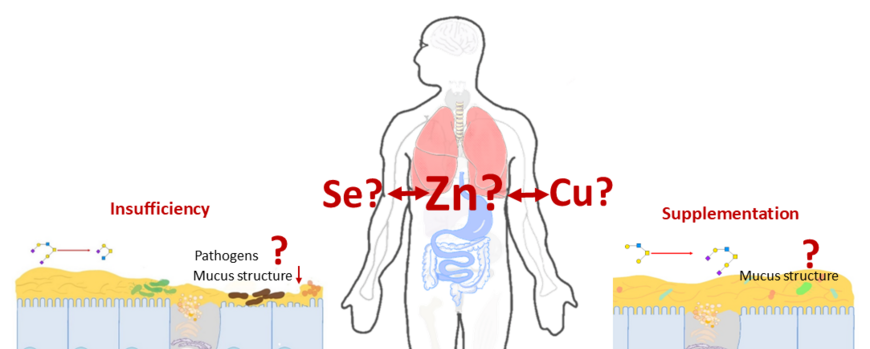Metalloglycobiology
Metalloglycobiology focuses on the role of trace elements for the glycome.
The human glycome encompasses all (cellular) processes associated with the glycosylation of proteins and thus the spectrum of all glycan structures, as well as the substrates, enzymes, proteins (and chaperones) involved in glycosylation. Our research results to date strongly suggest that trace elements, especially zinc, play a role here and are of great importance for the formation of the intestinal mucus layer. Zinc deficiency alters the cellular expression of mucins in the intestine and their O-glycosylation, which has a decisive influence on the composition of this barrier and is therefore also relevant for the microbiome and the intestinal immune system. New results show that selenium also appears to have an influence on mucin synthesis. Research into the underlying molecular and regulatory processes, which are the focus of our study, is highly relevant, as zinc deficiency increases the risk of infection, is associated with diarrheal diseases, which have a high mortality rate and currently affect about one billion people worldwide.
Glycosylation is an important modification of proteins, plays a crucial role in many biological processes and is used as a biomarker for various diseases such as cancer. The elucidation of possible changes in these processes therefore requires comprehensive screening of the human glycome. With our research, we want to contribute to the identification and characterization of further zinc-dependent targets in human glycome and to elucidate the connection with pathological processes such as inflammatory diseases. The influence of zinc and selenium on glycosylation is not only important for all types of mucous membranes (gastrointestinal tract, lung/respiratory tract, eyes, cervix) and the composition of the microbiome, but also for the development of diagnostic tools for diseases.
To investigate metalloglycobiology and elucidate the role of zinc and selenium, we use various in vitro and in vivo models with altered trace element homeostasis and analyze mucins, glycosyltransferases and other glycogenes as well as the O-glycan and monosaccharide composition of (secreted) mucins using various methods: These include molecular biological methods, glycome and mucin imaging with histological, immunochemical and lectin-based detection as well as MS-based analyses of O-glycan composition.
Projects
- DFG MA 9681/1-1 - Molecular changes of the intestinal mucus layer composition during zinc deficiency: (Sub)cellular processing and O-glycosylation of mucins
- Impact of selenium on the intestinal mucus layer
- Essential trace elements and the glycome during endometriosis
Cooporation partners:
Prof. Dr. Catherine Robbe Masselot, Dr. Renaud Léonard (Department of Glycobiology, University of Lille, France)
Prof. Dr. Dorothee Günzel (Institut for Clinical Physiology, Charité Berlin, Germany)
Prof. Dr. Albert Braeuning und Dr. Heike Sprenger (Effect-Related Analytics and Toxicogenomics, German Federal Institute for Risk Assessment)
Prof. Dr. Daren Knoell (Department of Pharmacy Practice and Science, University of Nebraska Medical Center, USA)
Dr. Renata Voltolini Velho, Prof. Dr. Sylvia Mechnser (Endometriosis Centre Charité, Charité Berlin, Germany)

